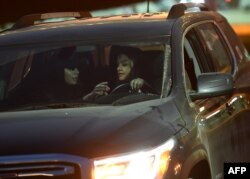Saudi Arabia on Sunday will lift the world's only ban on women driving.
The move is a milestone for Saudi women who have had to rely on drivers, male relatives, taxis or ride-hailing services to get around.
Earlier this month, Saudi Arabia's government began issuing licenses to women who already held driving licenses from other countries, including Britain, Lebanon and Canada. The women took a brief driving test before receiving their new licenses.
However, most women in the country do not yet have driver's licenses. Many women have not had a chance to take driving courses, which have been offered for only a few months.
Bloomberg news agency said its interviews with Saudi women showed the majority were conflicted about the new development, both being excited to drive but also wanting to respect their culture. Women say it will most likely take some time for society to adapt to the change.
Car companies are also gearing up for the change, with car sales expected to increase once the country's 10 million women are allowed to drive. Earlier this year, Ford sponsored a driving experience for women in Jeddah.
Ride-hailing services Uber and Careem say they have begun recruiting female drivers for when the ban lifts.
While Saudi Arabia's government has been taking steps to legalize female drivers, police last month arrested several women who campaigned for the right to drive as well as campaigned against the country's male guardianship system. Rights groups say four women remain in custody, facing possible trial.
In Saudi Arabia, women are legally required to get approval from a male guardian for legal decisions. These can involve education, employment, marriage, travel and medical treatment.
In announcing the government's decision to lift the ban on female drivers last year, Prince Salman said women would not need approval from their guardians to get a driver's license and would be able to drive alone in the car. He said they would have permission to drive anywhere in the kingdom, including the Islamic holy cities of Mecca and Medina.
The prince said the decision marks a “huge step forward” and that “society is ready” for the change.






